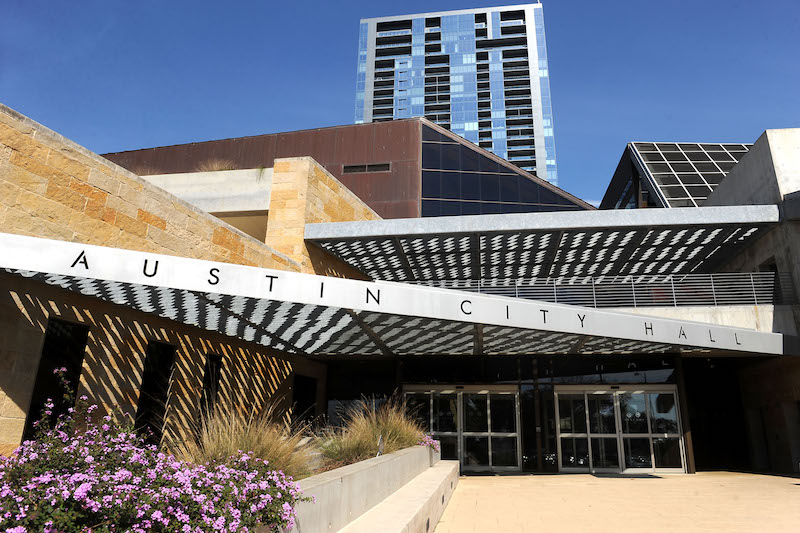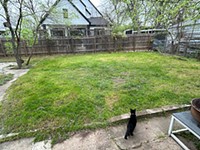Council OK's Motel Purchase to Help Homeless
Also on the dais: parks, trains, trails, diapers
By Austin Sanders, 1:45PM, Fri. Nov. 15, 2019
City Council approved unanimously on Thursday, Nov. 14, $8 million for the purchase and renovation of the Rodeway Inn at Oltorf and I-35 to serve as temporary bridge and permanent supportive housing for those now homeless and unsheltered.
The motel has 87 rooms, but a handful of those will be used as office space for the caseworkers on site; the Ending Community Homelessness Coalition, which will help operate the facility, expects to help hundreds of people move into and out of the site and to independent stable housing.
ECHO executive director Matt Mollica has experience running similar facilities for Denver’s homeless agency, which offers an appealing approach to housing the unhoused since facilities can be brought online quickly and at a lower cost than buildings that need to be converted from other uses, and that are priced to reflect those uses, let alone building housing from the ground up. One example: the proposed South Austin Housing Center on Ben White Blvd., an office building that Council had voted in June to purchase for $8 million excluding any conversion or renovation costs, a plan that’s now been superseded by the Rodeway Inn.
While the purchase was approved without opposition, a small contingent of neighboring residents and business owners showed up to speak against the plan, echoing the fears Council heard from the SAHC neighbors in June – negative impacts on property values and on business traffic, dangers to children at nearby schools, and higher crime rates in the area, which has what the neighbors characterized as a drug problem near two other motels along the highway. The president of the nearby Timber Ridge owners’ association, Henri Daumus, bluntly voiced his concerns: “I am in plain view of this facility,” he told Council. “If I see a homeless shelter there, I will be motivated to leave.”
Mollica responded amicably: “I'm glad that the speakers previous to me came up and expressed their concerns. I think that it goes a long way to addressing some of the NIMBYism that occurs with regards to people experiencing homelessness.” He noted that ECHO will be active in the community to ensure it remains safe and to address concerns from residents, and added, “I believe everybody deserves a dignified place to sleep ... we believe hotels (are) a good step towards that.” Once opened, the shelter will have 24-hour security, with people forbidden from camping within one-quarter mile of the building, and will only accept new tenants through referrals – meaning only those who are deemed ready to live in the facility will be allowed in.
Council members acknowledged both sides of the conversation, committing the city to closely monitor public safety in the area. Council Member Kathie Tovo, who represents neighborhoods near the site (which actually lies within Pio Renteria’s District 3), said that while no one in Austin should have to live near open-air drug markets, homelessness should not be equated with criminality. Mayor Steve Adler said that as the city moves forward with hotel purchases, “it’s incumbent on the city to address the concerns,” and “I hope with focus on this area in this way, conditions actually improve.”
A separate concern, raised by CM Alison Alter,was that purchasing the motel might displace people who are living there to avoid homelessness. Mollica said the city’s homelessness database, which ECHO manages, did not include anyone currently staying at the Rodeway Inn; if anyone there was at risk of homelessness, they could stay and ECHO would work to provide them services as needed.
Council also directed staff to evaluate funding mechanisms for two new stations on the Capital MetroRail Red Line, both near The Domain – one at the Broadmoor development emerging at the former IBM campus, and another at McKalla Place, future home of the Austin FC stadium. While Council broadly supported an expansion of rail service, several CMs urged against focusing on just one portion of the city’s overall mobility network. “I don’t want to think about the Red Line in isolation,” CM Greg Casar said, “just like I don’t want to think about the Orange or Blue line in isolation,” referring to the high-capacity transit routes through the central city being examined by the city and Cap Metro’s Project Connect planning effort. The resolution, approved unanimously, directs staff to report back in January 2020 with an assessment of different tools the city can use to collect funds to build the new stations. Those tools could include creating new tax increment reinvestment zones to capture added property value spurred by station area development. CM Leslie Pool, who carried the resolution and whose District 7 includes the two proposed new stations, said she was herself skeptical of those funding mechanisms, but did not want to exclude any avenue that could help make the stations a reality.
A companion resolution directs staff to explore a partnership with the Red Line Parkway initiative. The new non-profit, headed by longtime bike and transit advocate Tom Wald, is advocating for a 32-mile urban trail and linear park along the MetroRail corridor from Leander to Downtown Austin. Staff must develop a potential structure for the partnership and an implementation schedule within 180 days.
Rainey Street will have a new fund used to promote its history as a Mexican-American cultural district. The fund will collect development fees, alley vacation proceeds, and revenues from right-of-way closures within the district for projects that “enhance placemaking, promote cultural vibrancy, and celebrate the Mexican American identity, heritage, and history of the Rainey Street Historic District,” according to the approved resolution. The fund will be capped at collecting no more than $200,000 annually, as some CMs didn’t want to shortchange similar projects elsewhere in the city; dollars flowing to the Rainey Street fund would otherwise go to the city’s General Fund. The fund is an effort to make good on Council direction from back in 2013; due to a staff misunderstanding, the special district created back then lapsed after only one year.
Council also approved unanimously a parks master plan to guide the city for the next ten years. Its primary goal is to make parks more accessible to more people, both by improving access and acquiring new parkland. The Our Parks, Our Future has been in the works for years, finally achieving approval by the Parks and Recreation Board and Planning Commission in September; it sailed through with little change by Council.
Amendments from Casar, Alter, and Adler sought to expand the plan’s scope beyond the urban core, encouraging the city to seek out dense neighborhoods throughout the city that can support walkable parks. The plan calls for parks to be available to urban-core residents within one-quarter mile and for other Austin residents within one-half mile, which would require between 4,000 and 8,000 acres of new parkland over the next decade.
An ordinance change brought by CM Paige Ellis will require all new buildings in the city to have diaper changing stations available to both mothers and fathers – at least one per floor in gender-neutral restrooms, or one in each gendered restroom.
Got something to say on the subject? Send a letter to the editor.
A note to readers: Bold and uncensored, The Austin Chronicle has been Austin’s independent news source for over 40 years, expressing the community’s political and environmental concerns and supporting its active cultural scene. Now more than ever, we need your support to continue supplying Austin with independent, free press. If real news is important to you, please consider making a donation of $5, $10 or whatever you can afford, to help keep our journalism on stands.
Robert Faires, Sept. 23, 2014
Mary Tuma, Sept. 15, 2014
April 19, 2024
City Council Elections, Austin City Council, homelessness, Rodeway Inn, Ending Community Homelessness Coalition, Echo, Matt Mollica, Kathie Tovo, Timber Ridge, Steve Adler, Alison Alter, Capital MetroRail, Red Line, Project Connect, Broadmoor, McKalla Place, Red Line Parkway, Tom Wald, parks master plan, Our Parks Our Future











